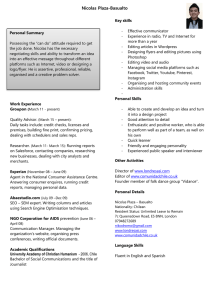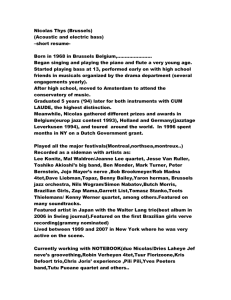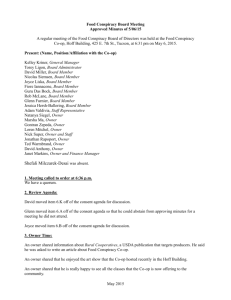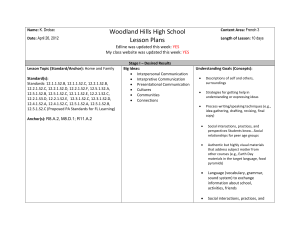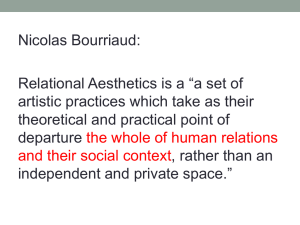File - Gabriella Valentino's Portfolio
advertisement
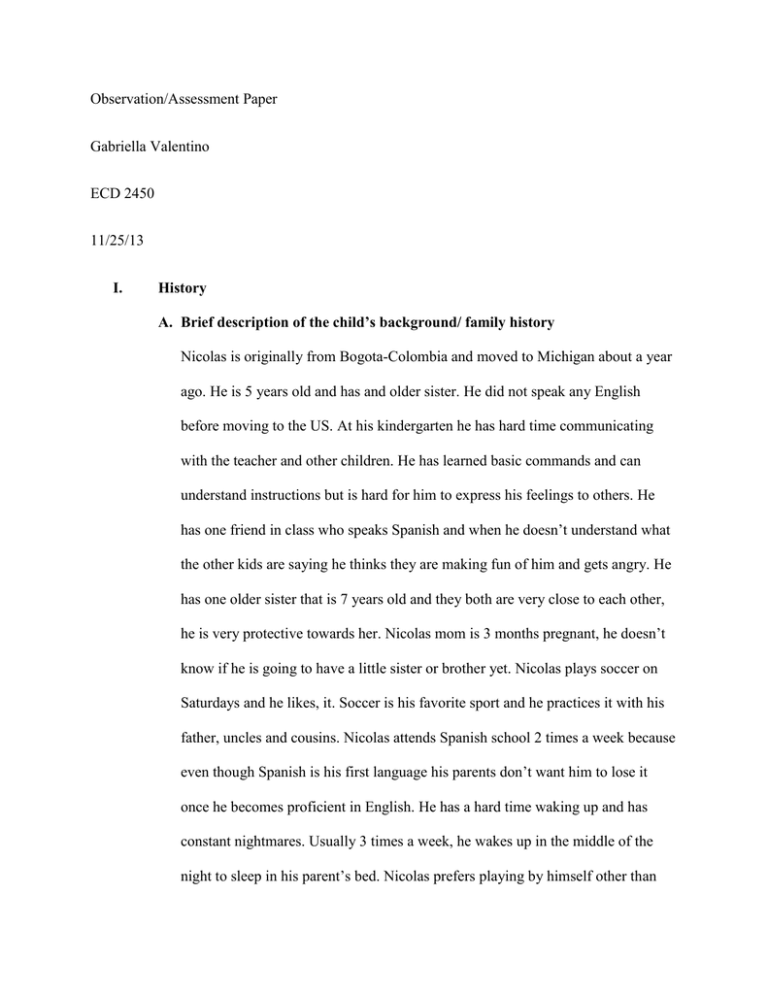
Observation/Assessment Paper Gabriella Valentino ECD 2450 11/25/13 I. History A. Brief description of the child’s background/ family history Nicolas is originally from Bogota-Colombia and moved to Michigan about a year ago. He is 5 years old and has and older sister. He did not speak any English before moving to the US. At his kindergarten he has hard time communicating with the teacher and other children. He has learned basic commands and can understand instructions but is hard for him to express his feelings to others. He has one friend in class who speaks Spanish and when he doesn’t understand what the other kids are saying he thinks they are making fun of him and gets angry. He has one older sister that is 7 years old and they both are very close to each other, he is very protective towards her. Nicolas mom is 3 months pregnant, he doesn’t know if he is going to have a little sister or brother yet. Nicolas plays soccer on Saturdays and he likes, it. Soccer is his favorite sport and he practices it with his father, uncles and cousins. Nicolas attends Spanish school 2 times a week because even though Spanish is his first language his parents don’t want him to lose it once he becomes proficient in English. He has a hard time waking up and has constant nightmares. Usually 3 times a week, he wakes up in the middle of the night to sleep in his parent’s bed. Nicolas prefers playing by himself other than playing with others. He likes to play pretend he is a super heroes; he makes up his own costumes using his clothes, sister’s, or his parents clothes and accessories. Weeks after he moved to the States his parents enrolled him in karate classes, at first he didn’t like it but once he learned the kicks and movement he got more interested in karate. His parents noticed that he was kicking at toys and furniture at home and that he became aggressive as a consequence of his karate classes so they decided to stop. B. Describe setting I observed Nicolas and his school where he attends Monday through Friday from 9-4pm. I observed him at his Spanish school where he is part of a class with other 10 children. I also got to spent time with him during his soccer practices and at his house. C. Describe your relationship with this child including how long you have known him/her. I have known Nicolas for almost a year. I teach Spanish to him and to her older sister and I am friends with his mom and dad. II. Description of the child A. Why did you choose this child? I choose Nicolas because I am concerned that his parents are called every week. I used to babysit for him a couple of times during summer and her summer camp teacher always had something to say about Nicolas violent behavior when I picked him up. Also, he is one of my students and I feel I need to help him change his behavior so it doesn’t gets worst as he gets older. B. What are child’s strengths/challenges Strengths: Nicolas is very creative; he can have the most fun with not toys but only his imagination. He is really loving and caring to his older sister. Nicolas likes sports especially soccer and he is really good at karate but he stop practicing it when he started acting violent in school. He loves animals and he is always looking to protect them. He is able to share his own feeling in his own language and he is very open to share them. He is very family oriented; family is the most important thing for him. He enjoys going to the movies with his father’s brothers and he respects them, he never shows aggressive behavior when he is around them. Challenges: He has hard time focusing in class and remaining in her sit for more than 5 minutes. He has just started learning English, he struggles to communicate in that language. He uses aggression towards his classmates and teachers. At home he plays roughly, throwing toys to the windows and walls damaging furniture and breaking windows. Nicolas struggles every morning to go to school, he doesn’t get enough sleep at night because he has constant nightmares and therefore he is tired the next day. C. How long has the child demonstrated difficult behavior? Since he moved to Michigan and started his karate classes. His behavior got worst when he entered school. III. TARGET BEHAVIOR A. Describe behavior Nicolas punches other children using his two fists rapidly until another adult separates them. Sometimes it gets to the point where he won’t stop punching the other kid until he sees blood. This behavior occurs daily up to 3 times a day. Nicolas has been sent home in different occasions when his behavior is unstoppable for his teachers. B. Describe antecedents While playing at the sand box Nicolas set aside the truck he was playing with, then came other kid and took the truck. Nicolas responded by running after him and proceeding to take the car out of the child’s hands and punching on the chest. In circle time Nicolas didn’t want to participate, instead he laid on the floor next to the sensory table. His teacher approached him and asked him to join the rest of the kids. Nicolas threw punches in the air hitting his teacher’s legs. C. Describe setting events Nicolas suffers o asthma and doesn’t use his medicine or takes it to school in case of an attack. Nicolas recently found out that he is going to have a brother or sister. He doesn’t Speak English and parents are not very involved in his school because they don’t know English either, therefore he gets little to no help on his school assignments at home. D. Describe consequences The teacher comes and separates him from the child he is punching. However, sometimes it takes his teacher at least 1 minute to realize they are fighting, until someone screams. She then makes sure they are playing separate from each other and spends time with Nicolas during his play. Nicolas avoids activities when punching his friends because he is sent to sit away from the rest of the children. He gets the assistant or teacher to sit next to him holding him making sure he doesn’t leave the table or bothers other kids. When he punches kids to get toys from them he most of the time gets the toy to him. When Nicolas acts aggressively he gets to play which whatever toy he wants in order to not distract and harm the other children. E. Why did you choose this behavior? I chose this behavior because he sometimes punches to the point where the other kid is bleeding. I believe that his aggression is separating him from the rest of the children and its making them fear Nicolas. I also believe this behavior is damaging his learning experience the most. It concerns me because I believe this is the only way he uses to communicate instead of putting words to his feelings and emotions. I am worried because if this behavior is not controlled and changed into positive behavior, it can have a big impact in his life and when he grows up it can turn out into delinquency acts. I also believe this behavior should be stopped and changed into a positive behavior because it worries me that once his new baby brother or sister is born he might hurt the new baby. F. How long has it been happening? This behavior has been happening since he started kindergarten and it has increased in the past weeks. G. What else do you know about? He started getting violent when he started doing karate; he practiced it for about 4 months. His behavior got worse when he started school so their parents decided to take him out of karate. Even though his violent behavior started months ago it increased by the time he was told he was going to be a big brother. IV. HYPOTHESIS A. What is your hypothesis? I believe Nicolas is acting aggressively at school, specially punching because he seeks for the teacher or other children’s attention. I also believe he feels he is left behind because he doesn’t speak the language and can’t communicate with the rest of the class. Nicolas punches because he feels the other kids make fun of him as I heard him saying it to his Hispanic friend. To me, Nicolas is frightened in this new world he is exploring far away from his home and listening to a language he is not familiar with. I believe he sees his teacher as the only person he feels comfortable with and wants her full attention to him because he feels scared to socialize with the rest. B. How did you come up with this hypothesis? I came up with this hypothesis based on my data collection and hours of observation. Also, talking to his parents and teachers helped me have a bigger picture of the situation Nicolas is going through. C. What forms did you use? I used the functional assessment interview form, the motivation assessment scale, the ABC (antecedent, behavior, consequence) chart form, the support planning chart, and notes I took from talking with their parents and teachers. D. Why did you choose this behavior? Because they were provided by my teachers and I used my personal notes to ask questions that were not included in the handouts. E. What information did they provide? They gave me a clear picture of what was happening before, during and after the behavior and to identify what was causing it. It also helped me to look for ways to turn his negative behavior into a good behavior and create new skills and abilities for Nicolas. I was able to tight the behavior to a reason, which allowed me to elaborate a behavior modification plan. V. BEHAVIOR PLAN A. Describe Plan As prevention strategy child will be offered visuals as he does not communicate effectively with his teacher or students due to his low proficiency in English. He needs to have available some visuals signs that makes him communicate with the instructor to express their feelings. Child can be offered to go to a safety place when he feels frustrated, irritated and no one is available to talk to him or give him the attention he needs. He can go there and take a minute to himself away from the rest of the children. These prevention skills will give the child time to think before reacting to punch other children, teacher or staff. Most importantly he will feel heard and that the rest are acknowledging his emotions and what he tries to express. It will teach child to say “I am scared”, “I want this” when facing his problems. It will be his new skill to use when he is in a situation he wants to use violence. This skill will make him feel that he is part of the group. These visuals would not only help him communicate with his teacher but the other students can learn to understand what he is trying to communicate and this would help him socialize with the rest. Another strategy would be to create a story with the help of parents to describe how the children feels in certain situations at school this story can be written in Spanish so that both parents and the child understands. This story should have pictures that demonstrate how he feels, what he thinks, how he reacts to the behavior and what the consequences are. This story should have a happy ending teaching the child to find other ways to solve his problems instead of using violence. B. Who will help implement plan? Teachers and staff will help implement this plan at school. At home, parents and family members will help. C. List reasons for intervention strategies I chose visuals because it is the only way Nicolas could communicate because of his lack of English. A visual supports that he can be understood by both, children and teacher. Moreover, he will learn how to put words to his feelings and it would be much easier for him to communicate. D. How will you include parents in this plan? I will have the plan written and translated to their language so that they fully understand our goals and how we expect them from helping us so that in both settings, school and work are working in the same way. I would also have their parents to be more involved in school and have a translator in our meeting if necessary or they could bring a family member that could explain them what is going on their child’s daily basic at school. Parents will help children to work on social stories where they can help child describe his feelings and emotions. They can reinforce the teacher’s plan from home. VI. WHAT COULD GO WRONG? A. What are the variables in your plan If the teacher is too late to respond when child is being pushed then she won’t be able to remind him to use the visual cues as I think child may need to be reminded when he is in that situation over and over until he learns to respond using visuals by himself. If parents are not tolerant and hit their child every time he punches his classmates then they will be reinforcing this behavior. B. What could go wrong and why? Child could use visual cues one time and then forget about it or it will take him time to get used to the use of visual cues. Child could need the use of another intervention like seeing a therapist if thee behavior does not stop with the plan. Children behavior could get worst once his baby brother or sister is born. VII. ATTACHMENTS A. Functional Assessment Form B. Motivation Assessment Questionnaire C. ABC Observation Form D. Supporting Plan Chart
